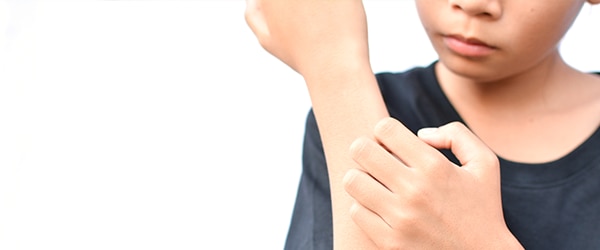Itching and scratching
When we scratch our skin, we become trapped in a real vicious circle which causes the aggravation, persistence and sometimes even secondary infection of lesions, especially in children, who do not always have clean hands and nails.
The consequences of itching and scratching are not visible only on the skin, and can include irritability and sleeping problems. This can have repercussions on life at school and work, but can also affect the family day to day.
Everyone with eczema scratches, no matter their age, this is an inevitable symptom. From the earliest months, babies with eczema rub themselves against the sheets and wriggle around. They have trouble sleeping and so do their parents. While growing up, children often scratch themselves very intensely, with the risk of scratching some lesions raw. During adulthood, patients are aware that scratching is bad, but it is sometimes difficult to stop themselves.
The consequences of itching and scratching are not visible only on the skin, and can include irritability and sleeping problems. This can have repercussions on life at school and work, but can also affect the family day to day.
Everyone with eczema scratches, no matter their age, this is an inevitable symptom. From the earliest months, babies with eczema rub themselves against the sheets and wriggle around. They have trouble sleeping and so do their parents. While growing up, children often scratch themselves very intensely, with the risk of scratching some lesions raw. During adulthood, patients are aware that scratching is bad, but it is sometimes difficult to stop themselves.
How itching can be limited
Furthermore, certain factors promote itching such as stress, heat or perspiration. We also scratch our skin out of habit, sometimes without even realizing it.
Pointing out to someone that they are scratching themselves or, even worse, telling them "Stop scratching!" will not calm the itching. In fact, it might even make it worse! Correctly using the treatment prescribed by the doctor and using alternative tools, (cold, relaxation, music, etc.) are recommended to keep itching and scratching to a minimum and to help restore proper quality of life and sleep.
Pointing out to someone that they are scratching themselves or, even worse, telling them "Stop scratching!" will not calm the itching. In fact, it might even make it worse! Correctly using the treatment prescribed by the doctor and using alternative tools, (cold, relaxation, music, etc.) are recommended to keep itching and scratching to a minimum and to help restore proper quality of life and sleep.

